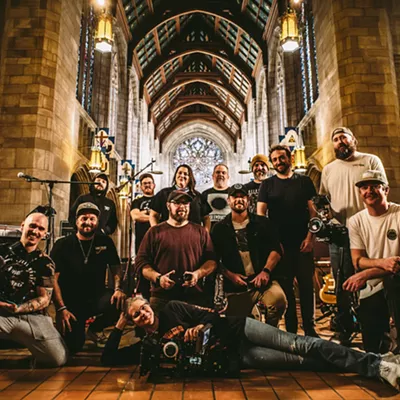Piloting a ship of slinky rhythms, shimmering vibes, twirling sax and noisy atmospherics through an instrumental sea, Critters Buggin reel off experimental jazz and alien motion picture soundtracks like they were the flavors of the month. They aren't -- but maybe they should be. In any case, this eccentric Seattle quartet has the power to make you believe. Surrender all doubt on Wednesday night when Critters Buggin kicks off a new national tour at the Met with their honored guests, a piano-bass-drum trio called the Bad Plus.
With a name that rings more rock than jazz and a sound that has way more to do with the avant-garde than it does with mainstream tastes, Critters Buggin is routinely consigned to that murky land of confusion, erroneous categorization and misinterpretation. Back when the group first formed in 1993, it was labeled "acid jazz." Now -- according to the group's saxophonist Skerik (that's all, just "Skerik") -- it's getting busted as a "jam band."
"Every eight or 10 years it's going to be something different," he laments. "Some new, stupid-ass thing. If you're an instrumental group, they don't know what to do with you. In the '60s and '70s, those bands were always in the Top 10. But today it's all guitar/vocal music just shoved down your throat."
For as much as the group's intriguing body of work -- Guest (1994), Host (1997), Bumpa (1998) and Amoeba (1999) -- has been overlooked by the pop world, it has garnered them even less respect from the jazz community.
"Oh my God," says Skerik. "If you're not playing purely acoustic music on acoustic instruments you're not going to get any jazz press at all. That's a problem. Critters Buggin in the industry has always been in between everything. The rock guys think we're a jazz group, the jazz guys think we're a rock band. We're always in no man's land."
The mainstream music industry may not know what to do with the group, but for Critters Buggin, it's always been perfectly clear. And for the good people who come out to the shows, it's a simple matter of enjoying it.
"The fans love music; they're not judging it or trying to label it. Thank God there are people who think on their own and go to shows and buy records and don't worry about it."
Stampede (Ropeadope) is the group's first new recording under the Critters Buggin banner since Amoeba. Like most Critters' releases, this creature has a personality that is split in at least four ways. That's partially because the Stampede sessions began with each member -- bassist Brad Houser, drummer Matt Chamberlain, vibraphonist/ percussionist Mike Dillon and saxophonist Skerik -- contributing a pair of new compositions. Then it was just a matter of committing it all to two-inch, 16-track analog, which gave the recordings a warmth and immediacy that you rarely find in today's digital dominion.
And even though the members spent the last five years in various side projects -- Skerik and Dillon in Les Claypool's Frog Brigade; Chamberlain as a hired gun for Tori Amos, Liz Phair, Macy Gray and others -- Skerik speaks of getting back into the Critters Buggin vibe like he would describe slipping into a favorite old suit.
"When you have a band like this that has a really strong identity, it's just really easy to do stuff," he says. "Because everything is just kind of built-in to help you. It has its own personality."
And watching this collective personality coax such an unlikely sonic mash from familiar instruments is truly a sight + sound experience to behold.
Busy Being Marley -- Farming is a family business. Being a blacksmith is a family business. Becoming an ironworker, managing a company or joining the steamfitters' union -- that's all family business. It's not odd to see skilled workers carrying on the work of previous generations, but it is a little odd to see performance art as a family business. Apparently music can be a family business, especially in the case of the Marleys. For them, music and carrying on the message of their father means business.
With a father who's been called the godfather of reggae music, the Marley children were trained from the beginning that music was life. And even after Bob Marley passed away, the Marley kids haven't had too hard of a time carrying on their dad's message to future generations of dread heads. For Ziggy Marley, music was life from a very young age. The eldest of the Marley children, Ziggy (nicknamed as a young boy for his love of David Bowie's space age alter-persona) began singing on Bob Marley and the Wailers' early recording sessions. His voice first appeared on a Wailers record at age 10, and he's been recording ever since. Before his father's death, Ziggy joined with siblings Cedella, Stephen and Sharon as the Melody Makers to record the single "Children Playing in the Streets."
From there, Ziggy and the Melody Makers recorded a series of albums, but they first received widespread recognition with their 1988 single, "Tomorrow People." The song came off the group's second album, Conscious Party, a work the Marleys recorded with Tina Weymouth and Chris Frantz of the Talking Heads. The Melody Makers' influence on reggae was hardly going to stop there. Their 1989 release, One Bright Day, broke into the Top 20, and sent the message to listeners that Bob Marley's infectious spirit was still living through the Melody Makers.
Maybe their success is because of their last name -- but it hardly seems that way when you look at how much music they've produced on their own. Julian Marley is a skilled percussionist. Damien "Jr. Gong" Marley has begun to make an impression on urban and hip-hop music in Jamaica. Stephen Marley is an accomplished producer. Cedella Marley has made her mark as an insightful singer and songwriter.
But perhaps even more interesting than the continued legacy of the Marley children through music is their unending quest to spread a positive, revolutionary message -- the same message that their father derived from growing up in the ghettos of Kingston, Jamaica. Ziggy Marley heads up the Unlimited Resources Giving Enlightenment (URGE) charity organization -- a group that aims to improve the communities in which children live, learn and grow. With Ziggy, Stephen Marley runs Ghetto Youths International -- an organization that aims to improve the educational, health and physical development of the impoverished youth of the world. All of the Marley children involve themselves in the Tuff Gong recording label, which continues making music with the purpose of inspiring people to seek peace, justice and self-fulfillment. It's not just music that is the family business of the Marleys -- it's changing lives.
Consuming Mass Quantities -- Like all natural phenomena in the known universe, Pig Out in the Park (now in its 25th year) can be described in purely mathematical terms. Break it down to the numbers and you'll see what I mean. Start with 48 restaurants, then add three beverage gardens, three stages and 50 bands and you've produced a total that is infinitely greater -- and more fun -- than merely the sum of its integers.
For as much as we may have come to take Pig Out for granted, almost all of us attend: It's never a matter of "if," only a matter of "when." And how often. When you get it down beyond the numbers, what you find is that there is no other single event in our community calendar where you can sample such a variety of food and music in one place -- all for an admission price (free) that folks of every economic strata can afford. The food choices alone can make you dizzy with hypoglycemia: teriyaki, cheese steaks, stir-fry, blackened salmon, Thai, barbecue, jambalaya burritos, enchiladas, bratwurst, stroganoff, Indian chicken curry, pizza and, yes, hamburgers. Keep your fork, because for dessert there's ice cream, cheesecake, baklava and pie. So don't be a snob -- and join us. I'll be the one with the gyro.
Then there's the music. Most of the performers this year are stretching their pipes either near the Clock Tower or on the stage in the Food Meadow across from City Hall. The action each day generally starts around noon-ish and wraps up at dusk. That's the "where" and the "when." As for the "who," there are way too many to list. So allow me run this not-really-so-random random sampling up the flagpole and watch to see who salutes it. Local husband and wife folk duo Mad Mama Moon get the whole Pig Out live music thing started Thursday at noon on the City Hall stage. Bluesy rock, blues-rock and just plain rock from worthy local and nationally touring bands are scheduled to follow. Friday's lineup includes the Chris Reiser Acoustic Trio (1:30 pm, City Hall stage), young melodic punks Sittser (4:30 pm, City Hall stage), this year's Bobfest winner, Mylestone (3:30 pm, Clock Tower stage) and jazz-funk-rockers Jupiter Effect (4:30 pm, Clock Tower Stage).
On Saturday, catch up with the Jim Boyd Band (2:30 pm, City Hall stage), Too Slim & amp; the Taildraggers (6 pm, Clock Tower stage) and '60s boogie rockers Canned Heat (what's left of them anyway, since two of their original members are long dead, play at 8 pm, Clock Tower stage).
Sunday morning is also looking mighty fine with a major jazz infusion in the works compliments of Alex Bedini (11:30 am) and the Cosmic Dust Fusion Band (1:30 pm). Brazilian singer/songwriter/keyboardist Paula Maya, country rockers Calico, Latin lovers Milonga, and that ska/ funk/rock gang known as Civilized Animal finish out the day at the City Hall stage, while Jr. Cadillac (it's alive!), Mulligan and Tommy Tutone (!!!) help entertain over at the Clock Tower stage.
Working Spliffs, Men in the Making and those lovable, cuddly Trailer Park Girls will help preside over the end of the Pig Out festivities on Monday.
By that point, the only thing left to do will be... to get ready for next year, of course.
Publication date: 09/02/04
















